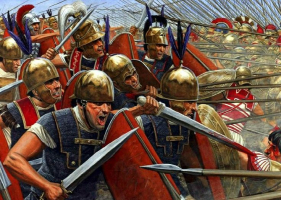Top 10 History's Most Pointless Wars
Throughout humanity's long and often-bloody history, there have been battles in which one side gained ground and promptly lost it again. And victories have ... read more...often been marred by the sobering reality of heavy casualties on both the winning and the losing sides. Many military clashes seem like a waste in retrospect, but are there any battles that stand out for their sheer futility? There are, sadly, many contenders. Here are the top 10 History’s Most Pointless Wars.
-
Most wars are named in a way that gives you an incline about what they were about or, at the very least, who was fighting. The names make sense like the Franco-Prussian War and World War I. So it's understandable to be perplexed when you hear about a war called The Pastry War.
The Pastry War had pastry as the cause, but it was more a war looking for a cause than a cause for a war. It took place in 1838 and 1839 between the nations of France and Mexico. Before this time, Mexico was still a very young nation and France was not entirely recognize their independence. The king of France still considered Mexico an extension of Spain, and France and Spain were not on the best of terms, nor had they been for a few hundred years.
France and Mexico built a trade relationship in 1830, resulting in new tax tensions. And this contributed to the exacerbation of an already minor issue. During a period of civil unrest in Mexico City in 1828, a man named Remontel had his pastry shop ransacked by Mexican soldiers, who ate all of his pastries, and he claim compensation.
Remotel demanded 60,000 pesos in restitution from the Mexican government although his shop was only worth 1,000 dollars. He complained to France after Mexico refused. The King required Mexico to pay 600,000 pesos. Mexico contended the ideal was utterly ridiculous. France responded by deploying warships to set up a blockade. One thing led to another and the next thing you know, 30,000 French soldiers had taken control of Veracruz and captured the entire Mexican Navy.
After seven months of making no progress against the French, Mexico had to seek the British to intervene on their behalf. They paid France 600,000 pesos and Remontel got his 60,000.
- Date:: 27 November 1838 - 9 March 1839
- Location: Veracruz, Mexico

Image by Abdulrhman Alkady via pexels.com Video by LoganProductions via youtube.com -
If you're going to start a war over food, you might as well make it more upscale. Take for instance the example of The Lobster War. Here In 1961, France and Brazil clashed over shellfish. French fishermen were catching lobster 100 miles off the coast of Brazil. Brazil said that was still on their continental shelf and therefore they were their lobsters. Both sides took the issue to their respective governments. Brazil dispatched six patrol boats to support the fishermen, which infuriated French President Charles de Gaulle, who dispatched a French destroyer to aid his own countrymen.
Because the Brazilians outnumbered the French, the French were forced to withdraw. Brazil told them they had 48 hours to leave. Since they refused, one French ship was taken as hostage.
Although no guns were fired, the dispute lasted three years. Diplomacy prevailed, and the countries proceeded to an international court. Brazil's government extended their waters to 200 miles, so there would be no further problems.
- Date: 1961–1963
- Location: Waters of Pernambuco, Brazil

Image by PublicDomainPictures via pixabay.com 
Image by thiago japyassu via pexels.com -
It would be remiss not to include the war between Molossia and East Germany among the most pointless wars in history. If you go to Dayton, Nevada, you might come across a plot of land that's just over an acre in size. This is the Republic of Molossia, a country that isn't actually a real place, but the man who runs it knows how to commit to a bit.
Molossia, an unrecognized micronation, was founded by Kevin Baugh, a former sergeant first class in the United States Army. His country was founded in 1977 as the Grand Republic of Vuldstein. Baugh pays property taxes, and, like any other country, it has experienced political strife. Since 1983, they have been at war with East Germany.You may notice that East Germany is no longer a country, but that hasn't stopped Baugh because he was stationed in West Germany when it was. East German military exercises woke him up in the middle of the night, and he vowed to wage war on that injustice. Even after the country ceased to exist, he pointed out that Ernst Thälmann Island was not named in the dissolution of East Germany, and thus he remains at odds with them.
Don't worry if the whole thing sounds like a joke. Baugh is well aware of his silliness and is simply having fun. But keeping a joke going since 1983 is quite impressive.- Date: 2 November 1983 - present
- Location: Ernst Thälmann Island

Image by Stockking via freepik.com 
Image by op23 via pexels.com -
The Huéscar War is one of the most pointless wars. Huéscar is probably unaware of its existence because it is not a great nation with a long history. That's because it's a town in Spain, not a country. It had a population of slightly more than 7,000 people in 2021. So Huéscar's decision to go to war with Denmark appears to be an unbalanced battle. And that doesn't even take into account the fact that the war had been going on for 172 years when it was officially declared over in 1981.
The war started during the Napoleonic Wars in 1809. Denmark backed France in their war against Spain at the time. Napoleon was defeated, and the Treaty of Paris was signed in 1814, effectively ending the war between all combatants. Except for one.Back in 1809, the town of Huéscar decided to join their countrymen in formally declaring war on Denmark. It was an unnecessary declaration because Spain was involved, but local politicians can sometimes have bigger, stranger ambitions than their station normally allows. They never went to war because the town had a total of eight municipal guards. The declaration was almost completely forgotten until it was rediscovered in 1981.
The town had to decide what to do about their still-active war against Denmark, which was still going on despite generations of people being unaware of it. They all agreed that ending the war was the right thing to do, and so the people of Denmark must have slept a little better that night.- Date: 1809-1981
- Location: Huesca, Spain

Image by Birmingham Museums Trust via unsplash.com 
Image by Sébastien Vincon via pixels.com -
It's difficult to call any war a good war, but there are some things you might want to see in a war if you had the choice. Low casualties are obviously the best outcome, and if a war can be fought without anyone dying, so much the better. The Kettle War was one such war. A single shot was fired, and the only victim was a soup kettle.
The not-quite battle was fought between the Holy Roman Empire, represented here by the Spanish Netherlands, and the Republic of the Seven Netherlands. The Scheldt River was under the control of the Seven Netherlands in the north. The Scheldt River was controlled by the Seven Netherlands in the north. In 1784, the Holy Roman Emperor decided it was time to reopen the river to trade and dispatched three ships to the northern nation. The Dutch responded with one.
When they collided, the Dutch vessel fired a single shot. It hit the kettle on the Le Louis, and the captain immediately surrendered. The Le Louis was far better equipped for war than the Dutch ship, so the surrender was unusual. That story made the war more remarkable when it came to the most pointless wars.- Date: 8 October 1784
- Location: River Scheldt

Image by Nishant Aneja via pexels.com 
Image by OpenClipart-Vectors via pixabay.com -
A typical war involves two or more parties arguing over land, religion, trade, or a variety of other issues. However, the participants are almost always human. Not so in The Emu War, which had no poetic or metaphorical name. It was an emu war.
Following World War I, the Australian government began granting veterans land plots. Thousands of acres of farmland were made available because Australia has plenty of space. However, it was not technically uninhabited. The emus were present. And they were making a commotion. They destroyed crops and were large enough to literally knock over fences by running at them.By 1932, the birds had a bounty placed on them. The farmers were unable to handle all of them, so the military was called in. They cornered 1000 of them, but the gun they planned to use to kill them jammed. They took out about 10. They'd killed 200 people after several days of trying and 2500 rounds of ammo. The total number of bullets wasted per emu shot was around ten.
By 1934, the government had provided farmers with ammunition, and the emus did not fare well. Despite nearly 60,000 deaths, the species survived and is now protected.- Date: 2 November - 10 December 1932
- Location: Campion district, Western Australia

Image by HOerwin56 via pixabay.com 
Image by Mali Ancor via pixabay.com -
Another candidate for the most pointless war is The Anglo-Zanzibar War. Afghanistan's war lasted nearly two decades. It was not the longest war ever fought, but it was America's longest war. Of course, there is no set time frame for any given war, but they typically last a long time. At least a few days, right? The Anglo-Zanzibar War was only 38 minutes long.
The Sultan of Zanzibar died two days before the war. The replacement sultan had not been approved by Britain, as required by the official rules governing Zanzibar as a British protectorate. So Britain informed the new sultan that he had to leave. In response, he shut himself inside the palace.The British had a number of naval ships, including warships. The Sultan was ordered to abdicate by 9:00 a.m, but he refused. His artillery had been destroyed by 9:02, and the palace was collapsing. The sultan is said to have fled at the same time, and his forces surrendered by 9:40, effectively ending the war.
- Date: 09:00-09:40 EAT, 27 August 1896
- Location: Zanzibar Town, Zanzibar Sultanate

Image by Wild0ne via pixabay.com 
Image by Library Congress CC0 Images via canva.com -
Civil wars have occurred in numerous countries over the years, usually over land or ideologies, but not always. For example, The Bucket War in 1325 between the Italian city-states of Modena and Bologna.
According to legend, after several years of skirmishes and constant tension, a group of Modenese decided to prove they were better than their rivals in Bologna. One night they infiltrated the city without anyone noticing. They weren’t looking for trouble, so they just stole a wooden bucket from a well as a trophy. This prompted the Bolognese to dispatch an army to retrieve it. As a result, 30,000 Guelph foot soldiers came to the aid of Bologna on behalf of the Pope, while 5,000 Ghibellines joined the cause for Modena on behalf of the Holy Roman Emperor.Over 2,000 soldiers were killed, and some believe the bucket was nothing more than a colorful story to divert attention away from much more serious issues, such as Modena's capture of a Bolognese castle. In that version, they still stole a bucket.
An unwarranted conflict caused so many casualties and property damage that history describes it as one of history's most pointless wars.
- Date: 1325
- Location: Emilia-Romagna, northern Italy

Image by Anniepan via pixabay.com Video by OverSimplified via youtube.com -
In 1925 Bulgaria and Greece demonstrated that any pretence for war could be used if one nation was dedicated enough. The Stray Dog War is a perfect example in this case. Of course, as previously stated, that was all a ruse, and there were more serious issues at stake, including a dispute over claims to Western Thrace. Over the years, many soldiers had died on both sides.
In October 1925, a soldier stationed near the Greek-Bulgarian border lost control of a dog. The dog run straight to the Bulgaria side. The soldier chased him down, but when he got too close, the Bulgarians shot him.Pangalos, the Greek general, was not going to let this happen. He threatened Bulgaria with repercussions if they did not make amends, but they refused. Greece invaded and occupied a town until the League of Nations ordered them to leave and ordered Greece to pay for the damage they caused.
- Date: 19 thg 10, 1925 - 29 thg 10, 1925
- Location: Petrich, Bulgaria

Image by pixabay via pexels.com Video by Andy's Info Show via youtube.com -
There has been an Australian war against emus in the past, but at least the emus had a fighting chance. Not so for The Great Goat War, which was pursued by $10 million in UN funding, two helicopters, 100 hunters, and 500,000 rounds of ammunition. But, hey, the goats lasted nearly ten years after the war was declared, so that’s something.
First introduced by whalers back in the 1700s, a handful of goats migrated over a wide expanse of nearly impassable lava terrain to the northern end of Isabela in the mid-1980s, and by 2000 some 120,000 were tearing up the landscape. The goats overgraze on the same native plants that support the giant tortoise and other species, turning forests into virtual deserts. As late as the '80s, the tortoises, which live as long as 200 years, were endangered and well on the path to extinction. As a result, they had to leave. This resulted in a significant loss of food and income for locals, but no one fought back for the goats.
- Date: 1998 - 2006
- Location: Isabela Island, Galapagos.

Image by Ellie Burgin via pixels.com 
Image by Maxime Agnelli via unsplash.com































